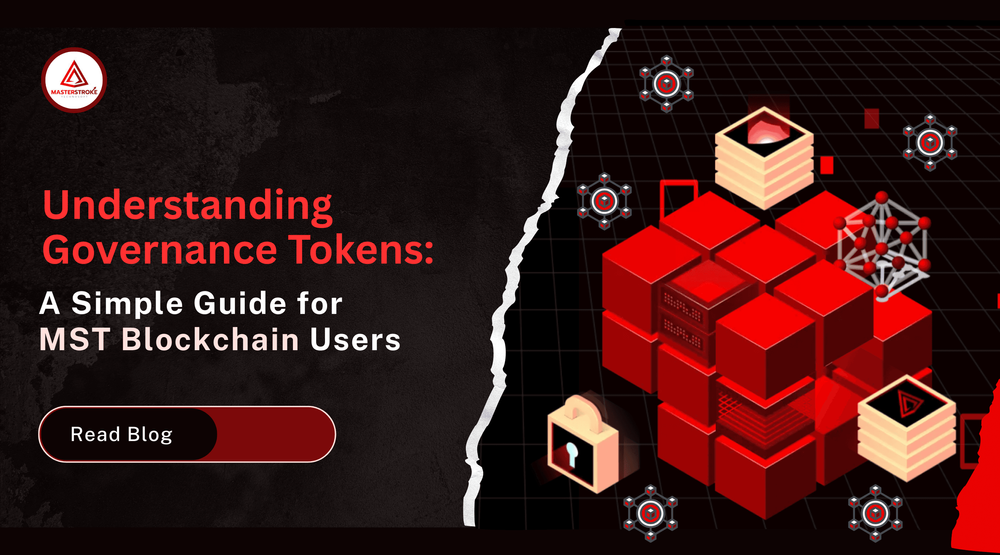What Are Governance Tokens? A Beginner’s Guide for MST Blockchain Users
 Masterstroke Technosoft
Masterstroke Technosoft
If you’re new to the world of decentralized finance (DeFi) or just starting to explore the MST Blockchain, you’ve probably come across the term “governance tokens.” But what exactly are they, and why should you care?
In this beginner’s guide, we’ll break down governance tokens in simple terms—no technical jargon, just the essentials you need to understand how they work and how they can empower users like you.
What Is a Governance Token?
At its core, a governance token is a special kind of cryptocurrency that gives holders a voice in the future of a blockchain project. Unlike regular tokens, which are often used just for payments or transactions, governance tokens let users participate in decision-making.
Think of it like owning a tiny piece of a company and getting to vote on big decisions—except this is all happening on the blockchain, and no middlemen are involved.
Why Do Governance Tokens Matter?
Blockchain projects are meant to be decentralized, which means they aren’t controlled by one single person or company. But someone still has to decide how the project evolves—like which features to add, what rules to follow, or how funds are spent.
That’s where governance tokens come in.
They allow the community—that includes users, developers, investors, and more—to vote on proposals and shape the direction of the project.
Real-Life Example: Voting With Your Tokens
Let’s say MST Blockchain wants to introduce a new feature that reduces transaction fees. The team could create a proposal, and if you hold MST’s governance token, you’d get to vote “yes” or “no.”
- If enough people vote “yes,” the change gets implemented.
- If most vote “no,” the idea goes back to the drawing board.
The more tokens you hold, the more weight your vote carries. It’s a bit like how shareholders vote in traditional companies.
What Can You Vote On?
Depending on the project, governance tokens can give you the power to vote on:
- Protocol upgrades
- Budget allocation
- Partnerships or integrations
- Community grants
- Token supply or burn mechanisms
On the MST Blockchain, we aim to make governance transparent and community-driven. That means if you’re an MST token holder, you have a real say in how the platform evolves.
Benefits of Governance Tokens
- Empowerment – You get a seat at the table and can help guide the project’s future.
- Transparency – Decisions are made publicly, on-chain, and often recorded forever.
- Incentives – Some projects reward active voters or give token holders other benefits.
Are There Any Risks?
As with anything in crypto, governance tokens come with a few caveats:
- Low voter turnout – If most token holders don’t vote, a few people can end up making all the decisions.
- Whale domination – Large holders may have more influence, which can lead to imbalances.
- Complex proposals – Not everyone may fully understand what they’re voting on.
That’s why at MST Blockchain, we’re focused on building educational resources and simple voting tools to help every user feel confident in participating.
What is Delegation in Governance?
Let’s face it—not everyone has time to read through technical proposals and vote on every decision. That’s where delegation comes in.
Here’s how it works:
If you hold MST governance tokens but don’t want to vote directly, you can delegate your voting power to someone else. This person (or validator) votes on your behalf.
Why delegate?
- Convenience: Stay involved without needing to manage every vote.
- Expertise: Delegate to someone more experienced or aligned with your values.
- Trust: Choose a representative you believe will vote in the ecosystem’s best interest.
And don’t worry—you don’t lose ownership of your tokens when you delegate. You simply allow someone else to cast votes for you.
On MST Blockchain, delegation is a seamless part of the governance model, giving users flexibility without giving up influence.
How Governance Ties Into PoSA Consensus
MST Blockchain runs on a Proof of Staked Authority (PoSA) consensus mechanism. If you’re not familiar with that term, don’t worry—it’s simpler than it sounds.
Quick breakdown:
PoSA is a hybrid model that combines:
- Proof of Stake (PoS) – where validators stake tokens to secure the network.
- Proof of Authority (PoA) – where trusted validators are chosen based on their reputation and track record.
In MST’s PoSA model, governance tokens play an essential role. Here’s how:
- Validators are selected through staking and community trust.
- Token holders can delegate their tokens to validators, helping secure the network.
- Delegation also influences governance—trusted validators often act as voting representatives.
This creates a secure, energy-efficient system where both security and governance are community-driven.
The MST Vision
At MST Blockchain, we’ve already built a live, thriving platform that empowers users through decentralization. Our governance system is not just a concept—it’s actively shaping the way MST evolves every day. Governance tokens are a core part of that system, allowing the community to collaborate, vote, and directly influence important decisions.
By holding MST’s governance tokens, you’re not just a participant—you’re a co-architect of a growing ecosystem that values transparency, fairness, and community-first development.
Final Thoughts
Governance tokens are more than just digital assets. They’re tools that allow everyday users to help shape powerful blockchain projects. Whether you're a developer, investor, or someone simply curious about the crypto world, understanding governance tokens is your first step toward becoming an active participant in the DeFi revolution.